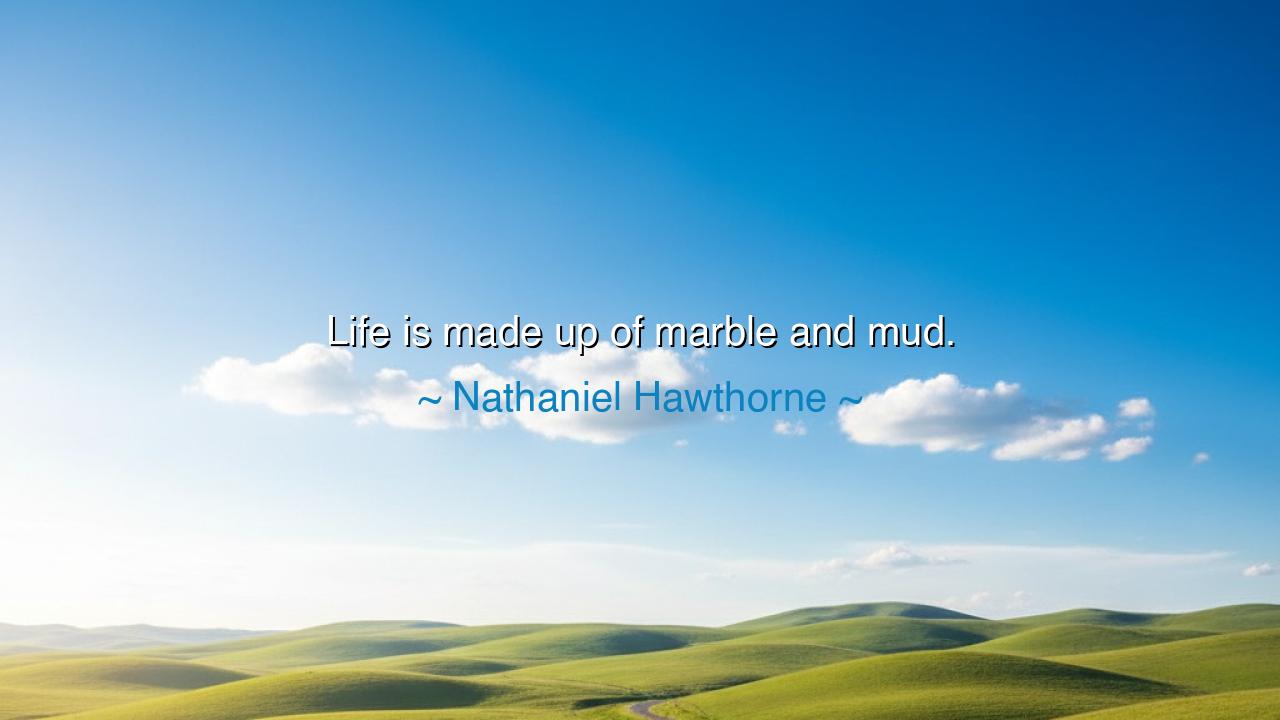
Life is made up of marble and mud.






“Life is made up of marble and mud.” Thus wrote Nathaniel Hawthorne, the great American novelist whose pen carved deeply into the soul of human nature. In this brief yet profound truth, he captures the eternal paradox of existence—the blending of virtue and sin, beauty and imperfection, light and shadow. The phrase, drawn from his novel The House of the Seven Gables (1851), is not simply a reflection on individuals but on humanity itself. Hawthorne saw that to live is to be divided, to contain both the divine and the earthly. Marble, cold yet pure, stands for all that is noble, eternal, and ideal in man—his aspirations, his morality, his art. Mud, dark and formless, signifies the passions, the errors, the desires that bind him to the world. And together they form the substance of life, for neither can exist without the other.
Hawthorne, descended from the stern Puritans of New England, knew well the struggle between spiritual purity and earthly corruption. His ancestors had condemned men and women in the Salem witch trials, and he carried that inherited guilt in his imagination. Through his writings, he sought to reconcile the human soul torn between holiness and hunger, between the laws of heaven and the needs of the flesh. In “Life is made up of marble and mud,” he acknowledges this duality with both acceptance and sorrow. For man cannot dwell forever in marble—perfection is too cold for the beating heart—and yet, if he sinks too far into mud, he loses all form and meaning. Life’s greatness lies not in choosing one over the other, but in learning to live within both.
The ancients, too, knew this truth. The philosopher Plato spoke of man as a creature between gods and beasts, his soul forever torn between reason and desire. The marble within us longs for order, clarity, and beauty; it seeks truth, justice, and transcendence. The mud within us hungers for touch, for warmth, for the chaos of feeling. Without marble, life would be savage; without mud, it would be sterile. Hawthorne’s genius was to remind us that both are sacred—that the divine is not found in denying our humanity, but in transforming it. The sculptor, after all, needs both the stone and the earth beneath his feet to create his masterpiece.
Consider the life of Abraham Lincoln, a man carved of both marble and mud. Born in poverty, he rose through hardship and doubt to become the guardian of a nation’s soul. His marble was his wisdom, his moral vision that saw slavery as a sin against creation itself. His mud was his melancholy, his loneliness, his inner torment. And yet it was this mixture—the purity of purpose forged in the fires of suffering—that gave him greatness. Had he been all marble, he would have been untouchable, too remote to inspire love. Had he been all mud, he would have been crushed by despair. But being both, he became profoundly human—and through that humanity, immortal.
Hawthorne’s words are not an excuse for weakness but a call to balance. He warns against the perfectionist who would deny his own humanity, and against the cynic who would surrender to his baser nature. The wise man understands that goodness is not the absence of sin but the mastery of it. Marble gives structure to the soul, but mud gives it life. The saint who forgets his own frailty becomes proud; the sinner who forgets his divine spark becomes lost. The secret is to walk the narrow road between, where compassion is born—from marble’s clarity and mud’s humility.
In this truth lies also the key to forgiveness. For when we see ourselves and others as made of marble and mud, we cease to demand perfection. We learn to love the flawed, to honor the effort rather than the outcome. The artist who stumbles, the friend who fails, the lover who errs—each is part of this same creation, struggling between the divine and the human. To live wisely is to recognize this struggle and to meet it with patience. For even marble cracks, and even mud, under pressure, can harden into stone.
So, my child of light and shadow, take this teaching into your heart: accept the dual nature of life. Strive toward marble, but do not despise your mud. When you fall, do not curse the earth that stains you—it is the same soil from which growth begins. When you rise, do not forget the dust beneath your feet—it is what makes your ascent possible. Purity without compassion is cruelty; passion without purpose is chaos. The art of living lies in blending the two, shaping your imperfections into strength, your flaws into wisdom.
For this is the eternal lesson of Hawthorne’s words: life is neither pure nor base—it is the alchemy of both. Every soul is a sculpture unfinished, each day a chisel stroke upon the stone of being. Embrace both your light and your darkness, and let them work together to form something enduring. For it is not the marble alone that makes the statue beautiful, nor the mud alone that nourishes the earth—but their union, their tension, their harmony—that creates the living masterpiece we call life.






AAdministratorAdministrator
Welcome, honored guests. Please leave a comment, we will respond soon